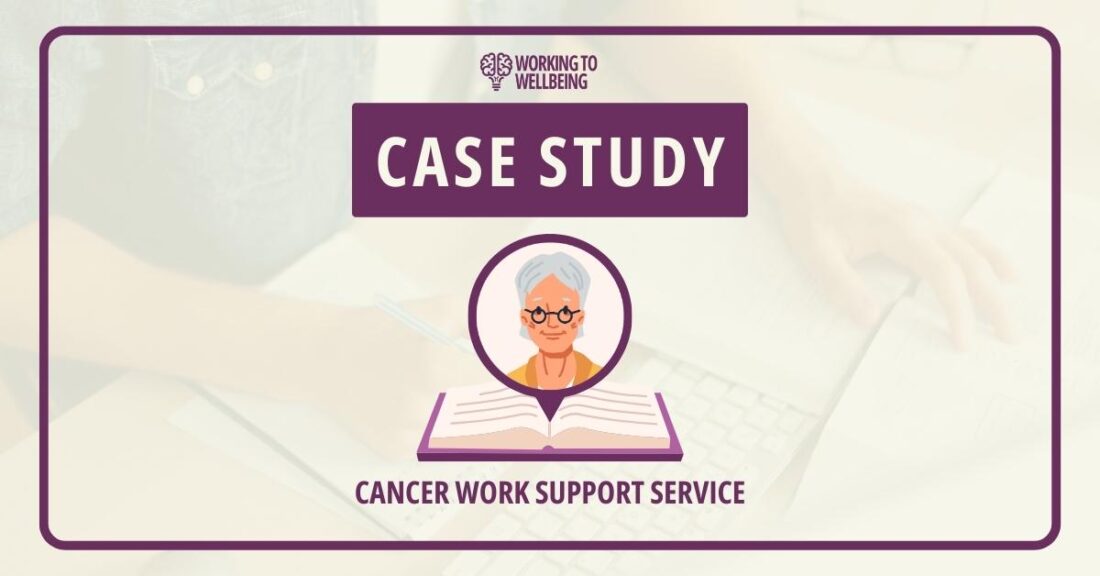Cancer Work Support Service Case Study
Karen is a 62-year-old Business Development Manager who was invited for a routine mammogram in the autumn of 2022. She had a fall that injured her breast prior to her mammogram, which produced a lump. She was cautiously optimistic that this lump merely resulted from the fall, however, after a mammogram and consequent biopsy of an anomaly found, she was diagnosed with malignant neoplasms of her right breast (breast cancer).
Karen stopped working in October 2022, when she underwent a mastectomy and reconstruction surgery. She began radiotherapy a couple of months later. After that, she started Anastrozole (hormone tablets) that resulted in ongoing symptoms such as joint aches, extreme fatigue and headaches.
Despite all that was transpiring, Karen described herself as a ‘pragmatic’ person who just wanted to ‘move forward’. She found herself leaning on her substantial support network of family and friends, considering herself lucky to have this. She did not feel that outside intervention was needed. However, once her insurance company became involved, she was offered support through her income protection scheme. They referred Karen to Working To Wellbeing (W2W). At this point she was presenting with painfully swollen upper limbs, a tight/bruised scar on her right chest, ongoing cognitive/physical fatigue and functional limitations. She reported that it was referral into this service that ‘kept [her] balanced’.
Karen was paired with a W2W clinical health coach in February 2023. Together, they explored the intricate nature of Karen’s difficulties and developed distinct goals to work towards. Karen was keen to reduce her pain and fatigue while increasing her functional ability, with the ultimate aim of returning to work. She was also interested in increasing her movement and walking capacity to aid both physical and mental health. She had the intention of ‘finding herself again’.
One of the most vital lessons that Karen reported she learned from her W2W coaching sessions was how to tell the difference between fatigue and tiredness. Pre-diagnosis, Karen tended to continually push herself, fearful of ‘giving in’. However, after working with her health coach, she garnered new perspectives about giving herself permission to rest and putting her health first. Her fatigue was likened to a mobile phone being charged. This was an analogy that resonated with Karen and helped her put the pacing pieces together: she knew that a flat mobile phone battery could never recharge without being plugged in properly. She realised that her own fatigue management was paramount, and her swift recovery was contingent on applying these principles. Her health coach continued to reinforce such self-compassionate concepts during their regular coaching sessions.
When ready and, over the course of her sessions, a return to work (RTW) plan was formulated that took Karen’s ongoing symptoms into consideration. Karen reports that her W2W coach’s support was absolutely critical at this point. This supportive input helped her recognise the most conducive time to return to work, based on her functional capacity rather than her own (or her employer’s) expectations. She returned five months later. Her employer fully supported a RTW plan that entailed a gentle phased return over 8 weeks. It was crucial that her RTW plan was a flexible working document that allowed Karen to progress holistically and in a pattern that worked for her, optimising her individual wellbeing. The principles of fatigue management, such as taking breaks, were converted into the work environment and Karen was encouraged to assert helpful boundaries that would preserve the functional gains she continued to make.
Having lived through diagnosis and treatment, Karen’s values shifted somewhat, and she began to pursue a healthier work/life balance. Her health coach helped Karen to translate these values into real-life aspirations, making her full-time return to work as seamless as possible. Alongside her increased hours, she continued to increase her walking and physical activity as well, even rejoining Sooke dancing classes that she previously enjoyed.
Karen was incredibly grateful to W2W for helping her to reestablish normality, regain her motivation, return to work in an incremental and successful manner and help her find and accept – and thoroughly appreciate – this new version of herself.


